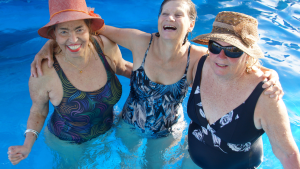As we women enter our 40’s and beyond, concerns about appearance often resurface, rekindling feelings of self-consciousness. What was once a conflict between budding maturity and body image is now a conflict between aging and body image.
You know how it goes: those “Oh no!” feelings that many of us thought we’d left behind in our teenage years.
The anxiety is similar, the discontent familiar. But now, at midlife, we have perspective, life experience, and even a bit of pessimism (born of physiological reality).
Unlike in our youth, our whole lives are not ahead of us. We spend a lot more time in the presence of our own mortality, even as we try to outpace it.
But there is no getting around the physical reality of aging, no matter how energetically, healthfully, and gracefully we embrace it.
The Mirror: A Reflection of Anxiety
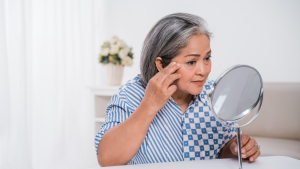
Do you find yourself examining your reflection more critically as the years go by? Maybe you scrutinize the lines on your forehead, panic over age spots, lament while tweezing the whiskers on your chin.
Many women in midlife become preoccupied with their appearance, leading to a mental battle reminiscent of adolescence.
It may even seem as if the struggle with body image never really ended before aging stepped in to complicate matters.
The mirror, despite its physicality, reflects more than just physical changes. And daring it to a stare-down can intensify worries about aging, weight, and societal expectations.
So here’s the question: How, in midlife, do you navigate self-image and societal pressures while also pursuing genuine wellness? How do you reconcile aging and body image so you can actually live a vibrant life?

Midlife rears a new challenge with self-concept and the pursuit of wellness. And somehow we’re expected to make peace between the anti-aging culture and the celebration of aging as a pathway to personal growth.
For those of us around the age of 40, the re-emergence of self-consciousness often feels frustrating. And it’s even worse if you believed teenage insecurities were a thing of the past.

Confronting anxiety about maintaining a youthful appearance can be overwhelming. When you still feel young in mind and spirit, it’s easy to revert to the mindset of wanting to look young. You know, hide those so-called flaws, as if the past never truly left.
The Struggle with Body Image and Eating Disorders
If you find yourself preoccupied with weight and dieting, you’re not alone. Research indicates an increasing trend of women in their 40’s and 50’s developing eating disorders.
Some are developing them for the first time; and others are experiencing a recurrence after years of recovery.
The important takeaway? There is no age limit to eating disorders.
The hormonal shifts and physical changes associated with midlife can lead to feelings of loss of control, prompting problematic behaviors, including eating disorder behaviors.
These behaviors are anchored in body image, if only for how one can see her body as a vehicle for control. And they often take the form of following Diet Culture myths regarding food and weight.
Those myths convert to rules like labeling food and oneself as “good” or “bad” depending on food choices. You eat carbs, deemed “bad” in Diet Culture, then you’re “bad.”
And here you thought this way of thinking and treating yourself was a misguided rite of adolescent passage.
Not surprisingly, studies suggest that women who battled eating disorders in their youth are at a higher risk of recurrence in middle age.
The Pressure of Anti-Aging Culture
Particularly for women in midlife, societal obsession with youth creates a veritable war zone between aging and body image.
Anti-aging messages fill our lives through advertisements, social media, and popular culture.
Products promising to “reduce visible signs of aging,” for example, contribute to the toxic message that aging is something to be hidden or fought against.
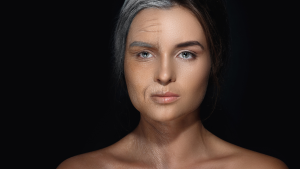
(And, if you listen carefully, you’ll hear the words “reduce the appearance of….” None of these products are promising to reverse aging or its natural progression.)
Celebrities become the focal point of this scrutiny.
For example, Andie MacDowell faced criticism for accepting gray hair.
And Sarah Jessica Parker has been scrutinized for her aging appearance. Her response to being labeled the “No. 1 Unsexiest Woman Alive” by Maxim Magazine reflects basic truth: “I have no choice. What am I going to do about it? Stop aging?”

Even seemingly positive portrayals of aging can perpetuate unrealistic standards.
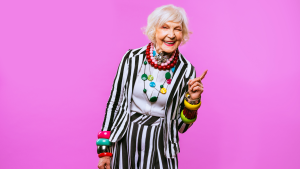
While figures like Jamie Lee Curtis promote a “pro-aging” narrative, the comparison to others who benefit from wealth and genetics can reinforce unattainable ideals. “Healthy for the wealthy” can breed its own discouragement for those who can’t afford products and lifestyles that foster “gentler” aging.
Understanding the Complexities of Eating Disorders
The psychological landscape of eating disorders in midlife extends beyond mere physical appearance.
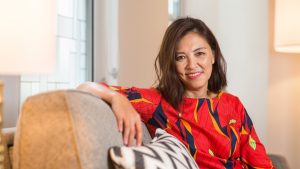
Life transitions – divorce, caregiving, career setbacks, the death of a loved one – often act as triggers. And these kinds of stressors can lead women to engage in unhealthy behaviors as a way of regaining control over their lives.
Eating disorders are serious. Conditions like anorexia can also lead to severe health complications, including high cholesterol, diminished immunity, and heart failure.
Unfortunately, women in midlife face specific hurdles in recovery.

Older women are less likely to bounce back from these disorders. Some may resort to dangerous methods like illicit drugs for weight control – or even drugs that are FDA-approved but certainly not benign. (Hello Wegovy and Ozempic.)
Embracing Midlife Wellness

Instead of surrendering to societal pressures and impossible beauty standards, women in midlife can reclaim their power by embracing a wellness mindset.
Jamie Lee Curtis articulates this in a 2022 Shape Magazine interview, in which she says, “This word ‘anti-aging’ has to be struck. I am pro-aging. I want to age with intelligence and grace and dignity and verve and energy.”
By shifting focus toward overall wellness (mental, spiritual, emotional, and physical health), women can mitigate effects of harmful societal expectations.
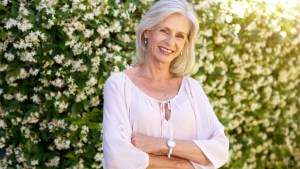
Celebrating the wisdom, experience, and strength amassed over the years can foster fulfillment that transcends physical appearance. Contentment with body image and aging can coexist!
Strategies for Enhancing Midlife Wellness
If you are going to live well as you age, you have to assume a mindset and life-practice of wellness. Below are 6 strategies for enhancing midlife wellness so you can do just that.
- Cultivate self-compassion: Acknowledge that aging is a natural part of life. Be kind to yourself. Engage in positive self-talk and focus on your accomplishments rather than perceived flaws.
- Prioritize physical activity: Find activities you enjoy – yoga, hiking, dancing, swimming – and incorporate them into your routine. Physical activity should be something you enjoy, not something used as punishment.
- Nourish your body: Shift the focus from dieting to nourishing your body with wholesome foods. Emphasize balanced nutrition that fuels your energy and supports your health.
- Connect with others: Nurture relationships with friends and family. Surrounding yourself with supportive people can provide emotional strength and a sense of belonging.
- Engage in mindfulness practices: Incorporate mindfulness techniques such as meditation or deep breathing exercises into your daily routine to alleviate stress and cultivate inner peace.
- Seek professional help if needed: If you find yourself struggling with an eating disorder or mental health challenges, reach out to a professional. Therapy can be a valuable resource in navigating these complex issues.
Celebrating the Journey of Aging
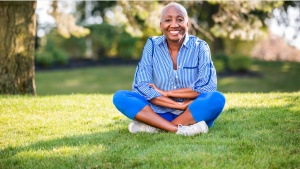
The path of aging does not have to be filled with despair or defeat. To the contrary, it can be a journey filled with opportunity for growth, self-discovery, and empowerment.
By embracing wellness and celebrating the unique experiences and wisdom that come with midlife, women can transform the narrative around aging. And body image can be restored to its birthright of self-love and complete self-acceptance.
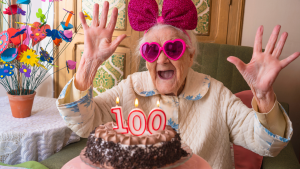
Every wrinkle, every gray hair, every “age spot” symbolizes not only the passage of time, but the stories we carry within us.
Dr. Elayne Daniels is an international coach, consultant, and psychologist specializing in eating disorders, body image, and High Sensitivity. She is anti-diet, Intuitive Eating certified and passionately believes comfort in your body at any size is your birthright. Contact her here for more information.
And, if you’re struggling with overcoming an eating disorder, this e-book might be useful.





